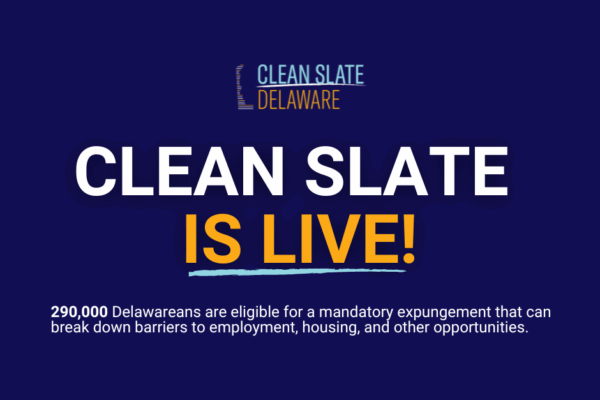Statewide—Today, the state of Delaware is set to go live with Delaware’s Clean Slate Law. This legislation automates the mandatory expungement process — one of three ways to clear a record in Delaware and the pathway with the most stringent eligibility requirements. The State estimated over 290,000 people living with a Delaware record meet the eligibility criteria for a mandatory expungement. This automation process is a huge win for Delawareans living with a record, employers seeking to fill open positions, and families across the state.
“In 2022, a lack of information and a burdensome expungement process meant less than 1% of those eligible for an expungement received one,” said Executive Director, Dave Bever at the Delaware Center for Justice, “Clean Slate’s automated process creates greater equity, consistency, and cost-effectiveness through a streamlined expungement process that applies to all eligible records — regardless of a person’s race or wealth. This is a vital step towards removing barriers to employment, housing, and other opportunities for individuals to participate fully in social and civic community life.” Nearly 9 in 10 employers, 4 in 5 landlords, and 3 in 5 colleges use background checks to screen applicants. People living with records are half as likely as other jobseekers to get a call back from an employer.
In 2021, Delaware became the fifth state to pass Clean Slate laws, Senate Bills 111 and 112 sponsored by Senator Darius Brown. Since then, CSDE has been working with lawmakers, state agencies, the courts, and community members to push for the full implementation of Delaware’s Clean Slate law.
“Clean Slate efforts don’t end after the passage of the initial legislation. Without successful and efficient implementation, eligible Delawareans will continue to be denied access to the Second Chances they deserve,” said John Reynolds, deputy policy and advocacy director at the ACLU of Delaware, “That’s why continuing to hold Delaware’s leaders accountable for a successful, accessible, and equitable implementation is so important. Specifically, Clean Slate Delaware calls on state agencies to create a pathway for people to learn if their record has been cleared by the automated process.” Currently, Delawareans only have two channels for learning whether the state has cleared their record through the Clean Slate process: the complicated Court public access terminals or the costly certified criminal history fingerprinting process, which requires individuals to pay a $72 fee.
Looking ahead to 2025, CSDE urges elected officials to champion legislation that removes fines and fees as a barrier to mandatory expungement eligibility. “Continuing the work to bring Delaware in line with known best Clean Slate practices is a win for all of us: it is life-changing for individuals, benefits families for generations to come, and has transformative power for our entire state,” said Reynolds.
Delawareans looking to learn more about Clean Slate eligibility and receive consolidated, accessible, and accurate information about the implementation process are encouraged to visit CleanSlateDe.org — a comprehensive digital tool for expungement-related information, events, and resources.
Those interested in learning more are invited to join CSDE partners at the Clean Slate Education Workshop on Tuesday, August 27 in Wilmington, the Lewes Expungement Clinic on Wednesday, September 4 in Lewes, or the Wilmington Alliance Expungement & Job Expo on Friday, September 20 in Wilmington.
Stay Informed
Sign up to be the first to hear about how to take action.
By completing this form, I agree to receive occasional emails per the terms of the ACLU’s privacy statement.
By completing this form, I agree to receive occasional emails per the terms of the ACLU’s privacy statement.

